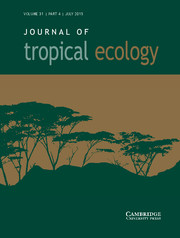Article contents
Differences in growth and light requirement of two sympatric congeneric tree species in an Indonesian floodplain forest
Published online by Cambridge University Press: 18 April 2006
Abstract
A prominent hypothesis to account for the maintenance of the woody species diversity in tropical forests is niche differentiation with respect to resources (Ashton 1969, Connell 1978). According to the hypothesis, species can coexist when each species is specialized for a specific set of growth conditions. Spatial and temporal variations in the forest understorey light conditions can be an important niche gradient. If species are adapted to a certain light condition for optimizing growth and share different optimal light conditions with each other, they can coexist by reducing direct competition; i.e. the regeneration niche differentiation sensu Grubb (1977). Species difference in rate of exclusion of trees in suboptimal light conditions due to mortality also contributes to species coexistence. Many scientists have emphasized the importance of the spatial and temporal variations in understorey light conditions on species coexistence in tropical forests (Clark & Clark 1992, Kohyama & Hotta 1990, Poorter & Arets 2003).
Keywords
Information
- Type
- Brief Report
- Information
- Copyright
- 2006 Cambridge University Press
- 5
- Cited by

